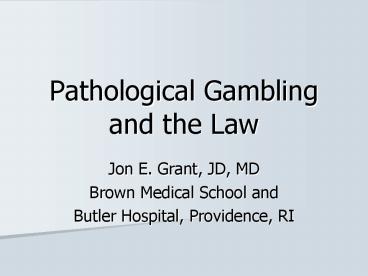Pathological Gambling and the Law PowerPoint PPT Presentation
1 / 22
Title: Pathological Gambling and the Law
1
Pathological Gambling and the Law
- Jon E. Grant, JD, MD
- Brown Medical School and
- Butler Hospital, Providence, RI
2
Case Example
- Robert is a 37 year old man started gambling
four years ago and became a problem last year. - Casino gambling, three nights per week.
- Has spent his savings and has gambling losses of
22K - Losses have been as cash advances on credit cards
3
- Intense urges to gamble
- Works for a company wherein he credited returned
merchandise to his personal credit cards. - Amount of embezzlement 30K
- No history of illegal activities
- Cannot control his money spends every dollar he
has on gambling - Tried to exclude himself but continued to gamble
- Attempted suicide because of finances
4
- Gambling is the child of avarice, the brother of
iniquity, and the father of mischief. - George Washington
- 1783
5
Crimes
- Fraud
- Stealing
- Embezzlement
- Forgery
- Robbery
- Blackmail
- Prostitution
6
Relation to Criminal Behavior
- 20-80 of pathological gamblers have engaged in
criminal behavior - 55 committed gambling-related offenses
- 21 have been charged with a crime
- 4-fold increase in illegal gambling-related
behavior
7
Causal?
- Crimogenic factor?
- DSM-IV criteria has committed illegal acts
- Need to maintain gambling is the primary
motivation for criminal behavior - As losses increase, the pressure to offend
increases
8
Risk Factors for Gambling-Related Illegal
Behaviors
- Younger
- Problems with multiple forms of gambling
- Owing debts to acquaintances
- Gambling-related suicidality
- Excessive substance use
- Other mental health issues
9
Gambling and Arrests
- Those with gambling-related arrests
- More likely to be male
- Unemployed
- Single
- Substance use problems
- Illegal activities but no arrests
- Female
- Bankruptcy
- Family problems
10
Other Legal Consequences
- Divorce 15 - 20
- Child Abuse 10 - 17
- Spousal Abuse 23 - 50
11
Relationship to Antisocial Personality Disorder
- Rates of ASPD in general population
- 1 3
- Rates among gamblers
- 0 40
- Individuals with gambling-related arrests more
likely to have ASPD features - 25 of prisoners were probable pathological
gamblers
12
Adolescents, Gambling, and Crime
- Rates of illegal activities were twice those for
non-gamblers (20 vs 10) - Stealing money for gambling was most common
- More likely to smoke, drink alcohol, and use
illicit substances - Rates of truancy higher
- More likely to be male
13
Adolescent Gambling
- Fisher study
- 46 stole from families
- 12 stole from others
- 31 sold their possessions
- Crime may be more prevalent among adolescents
- Fewer options to obtain funds
- Greater susceptibility to peer pressure
14
Specific Legal Issues Associated with Gambling
Addiction
15
Bankruptcy
- 28 to 32 of pathological gamblers had filed for
bankruptcy - One study of bankruptcy court opinions, 20 were
gambling-related - Of those filing, mean unsecured debt was 40K and
6 credit cards - 1995 cost to Minnesota was 228 million
annually
16
Laws of Bankruptcy
- Are debt from gambling included in bankruptcy?
- Not if the person intended to defraud the person
(e.g a credit card company) - Debt is discharged if the gambler intended to
repay the debt with the winnings (6th Circuit) - Ability to repay is not considered
17
Suits Against Casino
- Logan v. Ameristar Casino Williams v. Aztar
- Sued casino saying it knew he had addiction but
didnt bar him from casino - Duty of care?
- Must be statutory
- No common law negligence
18
Diminished Capacity
- Used for sentencing
- Courts generally fail to recognize this
- Committed the offense while suffering from
significantly reduced mental capacity - Drugs and alcohol are excluded
- Mental incapacity must be a contributing cause of
the crime - Able to absorb information and exercise reason
19
Insanity Defense
- Disease of mind prevents the person from knowing
the nature and quality of the act at the time of
doing it or that the person did not know it was
wrong - Insane if knew the act was wrong but the conduct
was beyond their control because of the disease - Does gambling addiction mean cannot control the
criminal behavior? - Some states have statutes barring this defense
for gamblers
20
Americans with Disabilities Act
- ADA proscribes employment discrimination or
termination based on disability - A disability must substantially limit one or more
major life activities - Does gambling addiction limit major life
activities?
21
Self-Exclusion Programs
- Legal status - Contract?
- Charged with criminal trespassing
- If cannot control behavior, should the gambler be
held liable? - If the gambler wins, winnings will be forfeited
if caught - Casino may be liable for negligent failure to
remove the person from mailing lists
22
Conclusions
- Pathological gambling and legal issues are linked
in a large number of individuals - Gamblers need to understand both their
responsibilities and their legal rights - Legal counseling in addition to financial
planning should be a part of the treatment plan
for many gamblers

